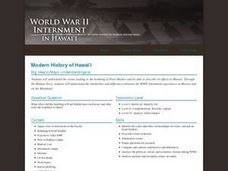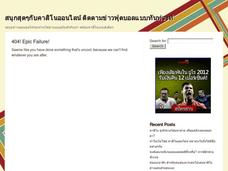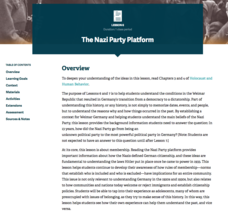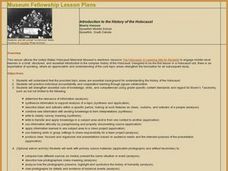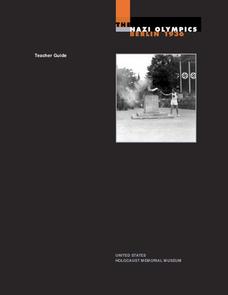Carolina K-12
World War II through the Radio Waves
Young historians channel the very medium used to convey news during World War I. They create and present a five-minute radio broadcast on a particular topic from the war, such as the roles of African Americans and women, war bonds,...
Curated OER
World War II: Modern History of Hawaii
Students examine world geography by viewing a documentary film in class. In this World War II lesson, students discuss the role Hawaii played in the great battle and what type conflicts happened among the island chain. Students view a...
US National Archives
WWII: Asia 1939-45 – Burma
Because World War II encompassed most of the globe in one way or another, many pivotal battles and events are not as visible in the history books, leaving veterans of these conflicts feeling overlooked by more famous skirmishes. High...
US National Archives
WWII: The Pacific 1939-45 – Japan and the Atom Bomb
Though the scientists who developed the atom bomb did not believe it should be used to end World War II, American President Harry S. Truman and British Prime Minister Winston Churchill were of like mind in their decision to drop the bomb...
US National Archives
WWII: Western Europe 1939-45 – D-Day
D-Day, also known as the Normandy Invasion, was a true turning point for the Allied forces and one of the most successful campaigns of World War II. After researching the factors that contributed to the campaign's success, high schoolers...
Curated OER
World War II New Guinea Campaign
Although the big picture for this instructional activity on the New Guidea Campaign of WWII is taking a field trip to the Douglas MacArthur Memorial, you can easily use it as a guide to an independent or group research project as well....
US National Archives
WWII: The Pacific 1939-45 – Pearl Harbor
Though December 7th, 1941 was a day "which would live in infamy," World War II had provided many infamous days, events, battles, and atrocities in the years before. So why were American forces so surprised when Japan attacked Pearl...
US National Archives
Eastern Europe 1939-45 — Berlin
The inevitability of World War II has arrived: Berlin has fallen. Young historians watch contemporaneous footage of the event, analyze primary source documents, and write a news report that details the roles of the Soviet, British,...
Facing History and Ourselves
The Nazi Party Platform
Not all party platforms stay democratic. A resource covers many political issues in Germany during the time of World War II, and teaches pupils about the Nazi party platform and what went wrong. Individuals participate in a warm-up...
Curated OER
The Battle of Midway
Students examine the Battle of Midway during World War II through an interactive website. They analyze photographs and read the descriptions. They discuss the implications of the Battle at Midway to both sides of the war.
Curated OER
The Battle of the Bulge
Students research the events and results of the Battle of the Bulge during World War II. As a class, they discuss the role of the military in the entire European theater and write a paper describing the situations and conditions the...
Curated OER
A Separate Peace
Tenth graders explore the novel, A Separate Peace by John Knowles. They discuss the events surrounding World War II and the events that were vital to progress during the war. Students locate New Hampshire on a map. They discuss the main...
Lincoln-Sudbury Regional High School
WWII Position Paper
There are some historical events that may warrant greater reflection and more in-depth analysis, and the decision to intern Japanese-Americans in the United States during World War II, as well as to drop the atomic bomb on Hiroshima and...
University of California
Decolonization
The ripple effect from one small event can impact many others. Young historians research the ripple effect World War II had on decolonization in the second installment of an eight-part series. Through primary and secondary documents as...
Curated OER
My Secret War: The WWII Diary of Madeline Beck: Lesson 6
Fifth graders explore women's rights by discussing the events of WWII. In this American work force lesson, 5th graders identify the events that led to World War II and how women helped fight the war through non-violent efforts. Students...
Curated OER
Introduction to the History of the Holocaust
The Holocaust is unbelievable! Examine this piece of history with your class. Using the Internet, research groups determine the relevance of information presented, compare how different sites present the same information, synthesize...
Curated OER
Focused Learning Lesson
Eleventh graders read and analyze primary source documents from World War II. They are to create a timeline of the important events by using the sources.
Curated OER
On The Home Front
Students write their responses to five questions about their home town. After watching an excerpt from "The War", they work together in groups to identify the characteristics of the four towns in the movie into a graphic organizer. ...
Curated OER
Life Prior to Kristallnacht (1933-1938)
Students research the way of life of the Jews before Kristallnacht. Using new vocabulary and resources, they discover how carefree life was before the days of discrimination and antisemitism. In groups, they create a timeline of the...
Curated OER
Guidelines for Teaching the Holocaust
Eighth graders view a presentation about the importance of the Holocaust. In groups, they complete a workshop in which they discover the reasons and actions behind the event. They share their feelings about the material and stereotypes...
Curated OER
Brave New World
Young scholars view a video about the effects of World War II on the map of Europe. They discuss the video and answer questions. They work together to identify accomplishments that best represent American culture.
Curated OER
A Day of Infamy:Analyzing FDR’s Pearl Harbor Address
In 1941 FDR spoke out on the events at Pearl Harbor. The class will get to analyze word choice, word meaning, author's craft and structure by analyzing an actual draft of this speech. They will look critically at the words used,...
US Holocaust Museum
Nazi Olympics: Berlin 1936
The Olympics are about more than sports—at times, the games are also a place of racism and prejudice! Pupils investigate the 1936 Olympics in Berlin, Germany. They analyze the meaning behind the materials included in the United States...
Curated OER
World War II
High schoolers examine the events of World War II that led to the dropping of the atomic bomb on Japan. Creating a decision making tree, they weigh the positives and negatives of the decision to use the bomb. They participate in a...

